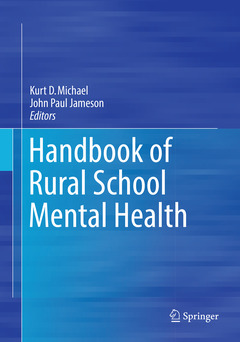Handbook of Rural School Mental Health, 1st ed. 2017
Coordonnateurs : Michael Kurt D., Jameson John Paul

<
- The value of rural SMH from an educator?s standpoint.
- Preventing suicide among students in rural schools.
- Substance abuse in rural school settings.
- Bullying and cyberbully among rural youth.
- Intergenerational patterns of mental illness in rural settings and their relevance for SMH.
- The importance of involving communities in culturally competent rural interventions.
Kurt Michael is a Professor of Psychology at Appalachian State University (ASU). He was trained at the University of Colorado - Boulder, Utah State University, and Duke University Medical Center. He teaches at the undergraduate and graduate levels and supervises several clinical training sites in rural schools. His primary empirical interests are the development of effective school mental health (SMH) and suicide prevention programs in rural settings. He is an Associate Editor of the Journal of Child and Family Studies. He was also appointed to the editorial board of the Journal of Rural Mental Health. In addition to Dr. Michael’s teaching and research interests, he is a practicing Licensed Psychologist and in 2006, developed and implemented interdisciplinary SMH partnerships entitled the Assessment, Support, and Counseling (ASC) Centers in rural western North Carolina. The ASC Center was designed to serve children and families in North Carolina while at the same time, foster workforce development, which aligns well with ASU’s strategic mission to improve the health of North Carolinians and to have a sustained impact on the region, both economically and culturally. Dr. Michael was recently honored for his long-term commitment to North Carolina citizens as the 2014 Board of Governors recipient of the James E. Holshouser Jr. Award for Excellence in Public Service. Dr. Michael consults with agencies on a national level regarding the development of crisis intervention and suicide prevention protocols for public school systems.
John Paul (JP) Jameson received his Ph.D. from the University of Pennsylvania in 2009 with a focus in clinical/community psychology. He is currently an Associate Professor in the Department of Psychology at Appalachian State University and a practicing Licensed Psychologist. JP serves as editor of the International Journal of Mental Health Promotion and is on the editorial board of the Journal of Com
Facilitates awareness and integration of best practices in rural school-based mental health programs
Synthesizes the recent evidence-based research
Examines the implementation, practice, evaluation, and sustainability of rural school mental health from the perspectives of multiple stakeholders
Addresses important issues in rural school mental health, including suicide prevention, autism, bullying, and substance abuse?
Includes supplementary material: sn.pub/extras
Date de parution : 05-2018
Ouvrage de 390 p.
17.8x25.4 cm
Date de parution : 10-2017
Ouvrage de 390 p.
17.8x25.4 cm
Thèmes de Handbook of Rural School Mental Health :
Mots-clés :
ADHD in rural school settings; Anxiety in rural school settings; Bullying in rural schools; Children’s mental health services; Community mental health; Conduct disorders in rural school settings; Depression in rural school settings; Pediatric bi-polar disorder in rural settings; Rural mental health; Rural school mental health; Rural school mental health programs; Rural school-based mental health; School mental health; School mental health in rural settings; School-based mental health in rural settings; School



